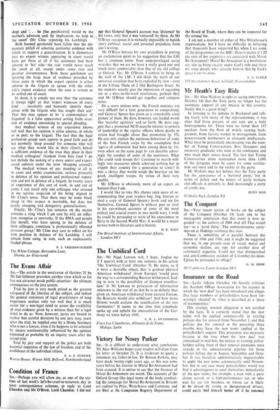Condition of France
Sus,—Perhaps you will allow me, as one of the vic- tims of last week's let's-be-cniel-to-resnewers day in Your correspondence columns, to reply to Lord Chandos and Mr O'Brien. Lord Chandos: I did not say that General Spears's account was 'distorted' by kis views, only that it was 'coloured' by them. As Mr O'Brien recognises it is virtually impossible to banish one's political, social and personal prejudices from one's writing.
Mr O'Brien betrays his own prejudices in putting an exclamation point to his suggestion that the LSE has a common room. Poor underprivileged social wretches that we are we have a really good one and 'much more comfortable than that of my old college at Oxford. Yes, Mr O'Brien, I confess to being on the staff of the LSE. I did think the myth of our universal socialism had been exploded by now—even in the Ultima Thule of 2 Old Burlington Street. As my students usually give the impression of regarding me as a dyef.,-in-the-wool reactionary, perhaps they and Mr O'Brien should get together and compare notes.
On a more serious note: the French mutinies are
very difficult for a later generation to comprehend, and General Spears has given us a remarkably vivid picture of them. He does, however, use loaded words like 'socialist agitators' and so forth. He does sug- gest that a promoted NCO must be inferior in powers /of leadership to the regular officers whose deaths in
action had brought about that promotion (p. 57). He can only explain the mutinous behaviour of some of the best French corps by the assumption that 'agents of subversion' had been among them (p. 51), even when on the same page he can describe admir- ingly the conduct of some of the mutineers. What 'else could such troops do? Continue to march will- ingly into massacres which achieved nothing but to cripple their country for a generation to come? It was a choice that would weigh the heaviest on the good, intelligent troops, by virtue of their very quality.
Mr O'Brien is obviously more of an expert on bunions than I am.
I would like to take this chance once more of re- commending that your readers buy, beg, borrow or steal a copy of General Spears s book and see for themselves. General Spears is without peer or rival in his eye-witness accounts of some of the most critical and crucial events in two world wars. I wish he could be persuaded to write of his experiences in Syria in the Second World War. It would be a major service both to literature and to history.
D. C. WATT
The Royal Institute of International Affairs, London SW1






































 Previous page
Previous page